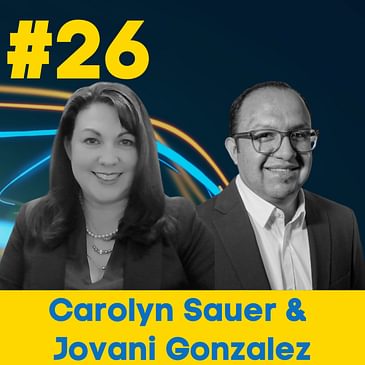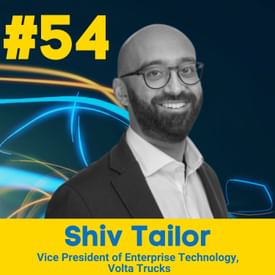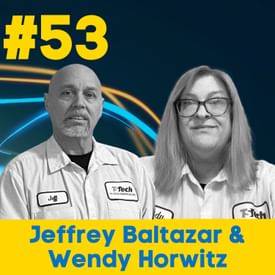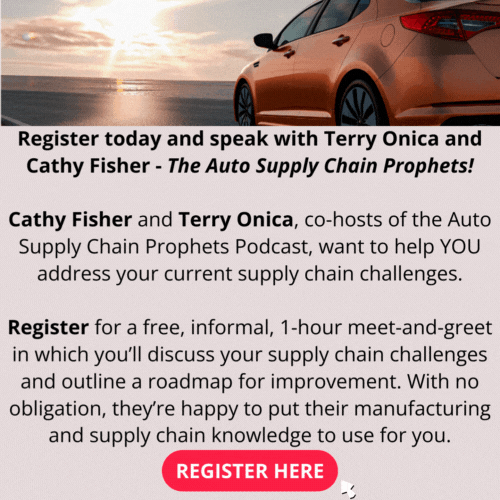Auto Supply Chain Prophets welcomes two guests from the OESA Supplier Summit in Novi, Michigan.
Supply chain shortages continue to persist in the automotive industry, but some EV parts suppliers are finding success and growing quickly despite the challenges. Jovani Gonzalez, CFO of Acument Global Technologies, and Carolyn Sauer, the business development director at Schaltbau North America, offer their perspectives on how to manage relationships with customers and suppliers.
As the automotive industry moves from internal combustion engines to electric vehicles, it’s more important than ever to have good communication with OEMs, tier suppliers — and internally. “Ask questions” and “fail fast” are the ingredients for future supply chain success.
Themes discussed in this episode:
- How suppliers can adapt to labor shortages and supply chain slowdowns.
- The automotive industry’s shift from internal combustion to EV.
- Why managing risk is better than avoiding it.
- Transferring technology from existing industries to EV opens new doors.
- Compared to automotive, the EV supply chain seems nontraditional.
- How close contact and frequent communication lead to business success.
Featured on this Episode
Name: Jovani Gonzalez
Title: CFO at Acument Global Technologies
About: Jovani is a finance and operations executive with more than two decades of experience in manufacturing and automotive. Acument develops and manufactures fastening and assembly solutions for industries including auto, EV and aerospace.
Connect: LinkedIn
Name: Carolyn Sauer
Title: Director, Business Development at Schaltbau GmbH
About: An experienced marketing and sales director, Carolyn currently oversees business partnerships around EV infrastructure at Schaltbau North America. Her passion for safe and scalable electrification is built on more than 20 years of experience with global Tier 1 suppliers.
Connect: LinkedIn
Episode Highlights
Timestamped inflection points from the show
[0:44] Built on tradition: Jovani discusses Fontana’s acquisition of Acument. Fontana is a global supplier of fasteners, and its long history of success can extend Acument’s reach.
[1:23] Shorthanded goals: How have labor shortages and supply chain slowdowns impacted Acument’s production? Jovani explains how his company approaches these challenges.
[2:15] Communication is key: Jovani sees an opportunity in building relationships. Suppliers must stay in close contact with OEMs as the industry moves from internal combustion engines to electric vehicles.
[3:14] Crunching the numbers: From a CFO’s perspective, Jovani explains the difference between avoiding risk and managing risk. Prioritizing efficiency combats the effects of inflation.
[4:29] Fail fast: Jovani’s recommendation to auto manufacturers is to be proactive. Future supply chain success relies on planning for changes, innovating and learning from mistakes.
[5:35] New kid on the block: Schaltbau may be an unfamiliar name to an automotive audience, but Carolyn shares how a rail company from Munich is bringing decades of DC power experience to the world of EV.
[7:01] Selling out: With so many applications for DC contractors in the EV space, Carolyn explains how one of the biggest supply chain challenges is finding the right buyer. It’s a big shift for the industry, but the increased networking presents an opportunity.
[9:37] The one thing: Carolyn’s advice for supply chain success is to ask more questions. “The best way to solve problems is to understand what people need.”
Top quotes
[2:03] Jovani: “Just like any other company in the automotive industry, we have been dealing with shortages in general [...] What we are doing is staying in close communication with our customers, but also with our suppliers.”
[3:40] Jovani: “One of the things we do as a company is not to avoid risk but to manage risk. We have to be in contact with all the changes in the environment.”
[4:44] Jovani: “One of the things that prevent the industry from moving forward is the inability to be proactive against changes. The only way that we have to improve that situation is by making a strong plan. We test. We call this fail fast — adopt a change, then start moving forward.”
[7:30] Carolyn: “There are so many different applications for [DC contactors] and so many relationships between the OEMs and the tier suppliers, that it's a challenge to figure out who's best to talk to. So, I try to talk to everyone.”
[10:11] Carolyn: “The best way for me to solve problems is to understand what people need.”
[Transcript]
Dietrich:We really can't predict the future because nobody can. What we can do though, is help auto manufacturers recognize, prepare for in profit from whatever comes next. Auto Supply Chain Prophets gives you timely and relevant insights and best practices from industry leaders. It's all about what's happening now in the automotive supply chain and how to prepare your organization for the future. Because the auto supply chain is where the money is.
Jan Griffiths:Hello, and welcome to another episode of the Auto Supply Chain Prophets. Join me Jan Griffiths, your co-host and producer along with your hosts, Cathy Fisher and Terry Onica. Today we'll bring you two more guests from the OSA supplier summit in Novi, Michigan, where we were live and in person. Our first guest is Jovani Gonzalez. Jovani is the CFO for Acument Global Technologies. It's interesting to get a different perspective through the eyes of a CFO. How does he see the challenges ahead for this industry? And how does the transformation to EV impact the fastener business you'll hear about the document methodology of fail fast. Jovani, welcome to the show and tell us what is going on in Acument.
Jovani:Acument has been acquired by the Fontana family, which is a very long tradition in the automotive industry, especially in the fasteners. This year, we are making it about the 70 years as a family in the business or very, very long tradition. Of course, no.
Cathy Fisher:Jovani, does your organization supply both Europe as well as North America?
Jovani:Yes, the Fontana family provides fasteners in Europe, but also in all America, North America, Mexico and Brazil. Of course, we also have a business in Asia, in India specifically.
Cathy Fisher:Oh, perfect. What type of issues has your organization been facing relative to supply chain if you've been having raw material problems or transport problems?
Jovani:Yes, I believe that, just like any other company in the automotive industry, we have been dealing with the shortages in general, that are mostly coming from the labor shortage, but this is also impacting a steel industry. Also the chemical industry, just recently, we have been challenging one of the most difficult problems with some of our main suppliers that are part of our main processes, specifically related with chemical. So basically what we are doing is to stay in close communication with our customers, but also with our suppliers. No, but yes, of course, we have been impacted the similar to all other suppliers.
Terry Onica:What were some of the opportunities or challenges as you see the industry transition from the internal combustion engine to the electric vehicle?
Jovani:Well, in our industry, specifically, the fasteners they change the from a combustion to electric is not having a huge impact, because basically we provide with supplies that are not necessarily linked with the transmission and with the power train. But what we are doing is to stay in contact with the new commerce like for example, we began obviously, with the Tesla in order customers, all OEMs. And we have already a very strong relationship with customers like General Motors for or for example, Stellantis as well. So we know that they all OEMs are doing a lot of efforts in this in this arena. And what we are doing now aside is to just be close to them in this transformation
Cathy Fisher:Jovani, with all of the disruptions and other challenges that your organization is facing, how from the CFOs position can you budget for supply chain costs and the risks associated with it.
Jovani:From the finance side, a one of the most important elements that we are covering is to be always self funded, we are obviously taking care of our cash position. And one of the things that we do as a company is not to avoid the risk, but to actually manage the risk. We have to be in contact with all these changing the environment. And we have not a behind we are a basically approaching our customers and approaching our suppliers trying to find opportunities to be more and more efficient, because obviously prices are going up in many aspects, inflation and we cannot prevent that to happen. But what we can do is to make a stronger our position. And our relationship with both sides, the customers and suppliers.
Cathy Fisher:To being a lot more proactive and understanding the roots of the industry then.
Jovani:Exactly! And more than that, looking for opportunities to become more efficient every every day.
Terry Onica:What is one specific action you would recommend automotive manufacturers take to ensure supply chain success in the future?
Jovani:I think that the more we plan, the more we are going to be able to prevent the changes in the supply chain. Right now, some of the things that are preventing the industry to actually move forward is the inability to prevent or to be proactive and against those changes. So the only way that we have to improve that situation is by making a strong a planning. And then something that they were doing Fontana is with testing, and we call this fail fast, adapt a change, and then they start moving again forward. So I think that that's what we have to do, especially when you have such a moving environment.
Cathy Fisher:I love that because that's along the lines of the innovation speech that Josh Linkner is just giving here at this event. So it's wonderful that your organization embraces that concept of fail fast and move forward. Learn from those because that's really what innovation is all about.
Jovani:Exactly. That's what we do in fontana.
Jan Griffiths:Our next guest today is Carolyn Sauer. Carolyn is responsible for business development for Schaltbau. Now, as an automotive audience, you might not be familiar with that company name. And that's hardly surprising because they are new into the automotive space. We often think about EV technology as being brand new startups brand new companies. But what about transferring technology from existing industries. Other industries into automotive and that's exactly what Carolyn Sauer is all about, with her role at Schaltbau. Now, Carolyn knows a thing or two about the traditional automotive industry as we know it, or have known it in the past, and what it takes to be part of the future as she transitions into a brand new venture. So Carolyn, tell us all about it.
Carolyn:Hi, Jan, I'm really excited to talk about this new venture. I am working with a company called Schaltbau in North America. It is a company based in Munich that has serviced the rail industry for over 90 years, and has a great deal of experience and DC power control systems, contactors, switches connectors, and we are expanding into working with electric vehicles, charging stations, testbench systems, and really applying our know how across different transportation modes.
Cathy Fisher:With your background and traditional automotive and now breaking into the EV space, what are some things that you're seeing that are shifting or changing in terms of supply chain in the industry?
Carolyn:What I'm finding, specifically to be interesting with the supply chain is and specific to the parts even that we're working with, with DC contactors is, who do I even sell these to? Am I selling to an OEM? Am I selling to a tier one a tier two, there are so many different applications for this product, and so many relationships between the OEMs and the tier suppliers, that it's a little bit of a challenge to figure out who's best to talk to. So I find that I just tried to talk to everyone. It's a learning as I go, you know, as opposed to the traditional background I followed, where we had specific contacts, and we knew who was doing what, it's still very new and still very experimental.
Cathy Fisher:I would say the industry is really shifting in terms of how the supply chain operates. Because the past, let's say 10, 15, maybe even 20 years, it's been very much about the OEMs pushing responsibility and content to the tier ones. And now because battery electric is so new to the industry, and many of them are feeling like yeah, we need to manage that ourselves. So maybe you're doing work with OEMs as well as the tier ones in some cases. Yeah?
Carolyn:Yeah! We're absolutely we're working with both. And again, we're also working with charging station companies. So we're really, we're fitting into all of those different modes. And what it's nice to see is that there is a lot more openness, I think, for OEMs and tier ones to take on new suppliers and to learn more about what other suppliers are doing. It used to be very rigid like this is who supplies x this is who supplies why that's who we're working with. But I think there's so much that's unknown about electric vehicles and how to really manage them so that they're safe. It really opens the door for some of us.
Cathy Fisher:And one of the things I wanted to ask you about since your organization, I'm assuming is new into the automotive space. How are you preparing yourselves to supply to automotive?
Carolyn:Right now we have our US location is in New York. We have a brand new factory called the Next Factory that's opening in Munich this year. And it's an automated facility, it's carbon free, and we are looking to in a couple of years replicate that plant here in the US, so that we're able to supply directly from here to all of the participants around the US, Canada and Mexico.
Terry Onica:So, what is one specific action that you would recommend to automotive manufacturers or suppliers like yourself, to have success in the future with supply chain?
Carolyn:I think there's there's a lot of different ways you can approach it. I feel like just being very open minded and not being afraid to talk to people and ask questions and admit when you don't know something is really the best way to make inroads and really get to know people and what they need. I mean, I consider myself I'm my title on the card says business development, but I'm a problem solver. So the best way for me to solve problems is to understand what people need.
Terry Onica:Excellent. Well, thank you so much for being on the show today.
Carolyn:All right, thank you so much for having me. It was so great to see all of you.
Dietrich:Are you ready to find the money in your supply chain? Visit www.autosupplychainprophets.com To learn how, or click the link in the show notes below.




